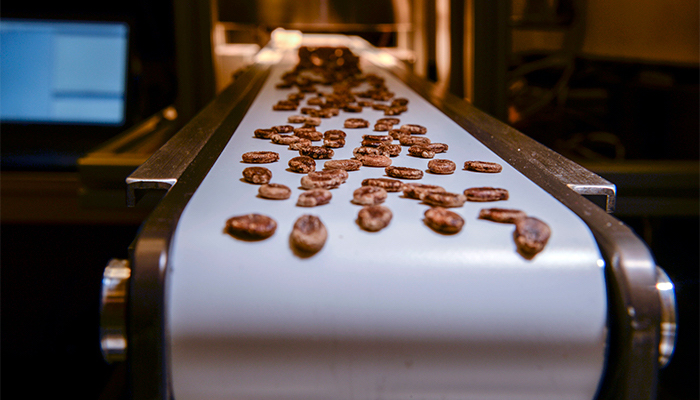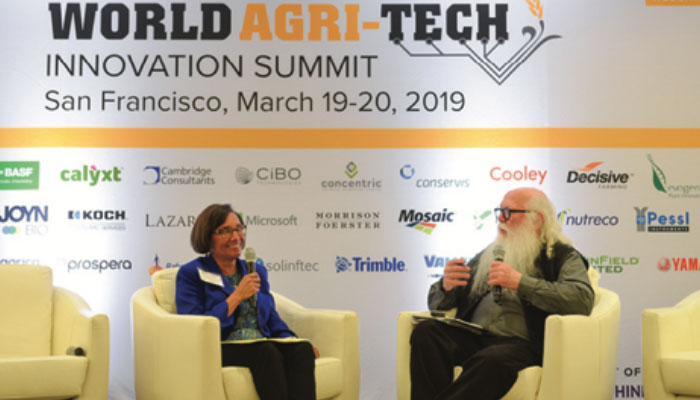
UC Davis Venture Catalyst and HM.CLAUSE have extended and enhanced their partnership on the UC Davis-HM.CLAUSE Life Science Innovation Center, a business incubator focused on advancing regional innovation in the life sciences.
The UC Davis-HM.CLAUSE Life Science Innovation Center is a 3,100 square-foot, off-campus facility located in Davis, California. The facility, which is owned and managed by HM.CLAUSE, a global leader in the production and sale of vegetable seeds, contains biochemistry, molecular biology and chemistry lab space, as well as 1,800 square feet of contiguous greenhouse growth facilities. Established in 2014, it is the only wet lab incubator facility of its kind in the Davis-Sacramento region, supporting life science startups ranging from agtech to human therapeutics. Startups are able to rent dedicated lab bench space in the facility ― which also includes access to shared lab equipment and instrumentation, office space, and meeting rooms ― for a period ranging between six months to two years.
The expanded partnership sets forth a commitment for a minimum of five additional years to support the facility and grow the associated resources available to early-stage startups and other innovative companies. To supplement the shared lab equipment and instrumentation available at the facility, Venture Catalyst has allocated funding received through the University of California Innovation and Entrepreneurship Expansion Bill (AB 2664) to make available additional technical equipment and specialized instrumentation for the benefit of startups leasing space in the incubator. HM.CLAUSE is also making improvements to the facility to expand shared office space and to provide access to additional lab bench space for tenants.
“The successful collaboration with UC Davis on the Life Science Innovation Center has provided us with a unique and beneficial opportunity to engage with innovative ideas being advanced by aspiring entrepreneurs and startup companies within our industry and beyond,” said Cecilia Chi-Ham, director of Innovation, Intellectual Property and R&D Strategy at HM.CLAUSE. “HM.CLAUSE is committed to supporting community-based, local and regional economic development and this is a visible and impactful example of our many efforts on this front.”
The UC Davis-HM.CLAUSE Life Science Innovation Center was the first member of the Venture Catalyst Distributed Research Innovation & Venture Engine (DRIVETM) Program, a network of business incubators on- and off-campus that provide university-affiliated startups access to affordable work space, laboratory space and equipment ― supplemented with support and resources provided by Venture Catalyst. As the region’s innovation ecosystem has matured, the DRIVE Program has grown to include eight members, extending the resources available to university-affiliated entrepreneurs and startups in the Davis-Sacramento region and beyond.
“We are thrilled to enhance our partnership with HM.CLAUSE, which offers wet lab incubator space that addresses the demand for specialized research and development facilities by many of the early-stage, university-affiliated startups we are supporting through Venture Catalyst and its programs,” said Dushyant Pathak, associate vice chancellor of Technology Management & Corporate Relations at UC Davis and executive director of Venture Catalyst. “This collaboration is a critical component in our efforts to cultivate robust technology startups and drive regional economic impact.”
In 2016, HM.CLAUSE received the inaugural UC Davis Chancellor’s Innovative Community Partner Award. This award recognizes a leader or organization in the UC Davis community that has contributed significantly to driving regional economic impact through innovation, entrepreneurship or support for growing a startup ecosystem in collaboration with the university.
Since its launch in 2015, ten early-stage startups have leased space in the incubator. One of the center’s first tenants, Circularis Biotechnologies, Inc., has made notable progress on business milestones while maintaining a presence in the incubator. Circularis has developed a novel method to regulate gene expression and enable increased production yields of proteins, enzymes and small molecules with applications across biotherapeutics manufacturing, industrial biotechnology, and large-scale agriculture. The company was founded by Paul Feldstein, assistant project scientist at UC Davis, to commercialize technology developed at the university. Circularis received funding and mentorship through its participation in IndieBio’s 2015 winter cohort and has since established partnerships with several companies utilizing the platform for industrial and medical applications. “Having access to the UC Davis-HM.CLAUSE Life Science Innovation Center has allowed my company to make significant strides in developing its technology in an environment that promotes collaboration and offers vital access to key pieces of technical equipment,” said Feldstein.
Another recent tenant, MiraculeX, arrived at the Life Science Innovation Center by way of IndieBio, where it participated in the 2016 spring cohort. MiraculeX has received funding to develop plant-based protein sweeteners, intended to be better tasting and healthier natural alternatives to artificial sweeteners for use in foods. Its ability to enhance flavor profiles of existing foods is expected to enable additional applications beyond sweetening, such as the potential to improve appetite in patients undergoing chemotherapy or suffering from chronic wasting conditions associated with reduced food intake. “The UC Davis-HM.CLAUSE Life Science Innovation Center and opportunities for engagement with faculty, staff, and students at UC Davis were critical factors in my decision to move MiraculeX to Davis,” said Alan Perlstein, CEO and founder. “Being able to work in a greenhouse facility and develop connections with the university and a strong network throughout Northern California has accelerated our progress on important company milestones.”
Current university-affiliated tenants at the UC Davis-HM.CLAUSE Life Science Innovation Center include:
- ARIZ Precision Medicine – developing new, targeted biology based and small-molecule based therapies for cancer.
- AstRoNA – combining RNA-based molecular biology and nano-technology/electrical engineering to rapidly and sensitively identify critical microbes, including pathogens of humans, animals and plants.
- Buto Biopharma – developing drugs that impact the Shc target, with implications for anti-diabetes and tissue protection.
- Circularis – developing novel methods to regulate gene expression and enable increased production yields of proteins, enzymes, and small molecules in cellular systems.
- Inserogen – biotechnology company that utilizes proprietary technologies to accelerate Pre-Investigational New Drug research and process development of therapeutic biologics for rare diseases.
- MiraculeX – developing platforms to mass produce natural plant-based protein sweeteners and products.
- PathLog Corporation – developing deep learning analytical tools and sensors for processing, financial analysis and tracking, risk assessment, and pathogen safety for vertically integrated food and agricultural product producers including poultry and pork.
About Venture Catalyst
UC Davis Venture Catalyst facilitates the translation of university research and technology by enabling the effective development of new ventures. Along with directly supporting campus innovators and community-based entrepreneurs, Venture Catalyst engages with the Davis and Sacramento business, government and economic development communities to articulate how UC Davis technologies and startups can be expected to generate regional economic impact. Working closely with these partners, Venture Catalyst is invigorating the technology-based entrepreneurial ecosystem of the region.
About HM.CLAUSE
HM.CLAUSE is a global vegetable seed company dedicated to meeting local needs through global diversity, and is committed to innovation inspired by worldwide partnerships in the scientific, industrial, and commercial fields. An innovative company whose core business is plant breeding, HM.CLAUSE specializes in the development, production, and sales of vegetable seeds worldwide. In 2008, Harris Moran Seed Company (USA) and Clause (France) were grouped together under the HM.CLAUSE Business Unit of Limagrain. HM.CLAUSE generated €325 million in annual sales in 2016 and employs more than 2,800 people full-time located in over 30 countries around the world. Its investments in research and breeding represent 14% of annual sales. The organization coordinates breeding for 25 species and has more than 800 people actively engaged in research and development activities. HM.CLAUSE is a Business Unit of Limagrain, an international agricultural co-operative group, specializing in field seeds, vegetable seeds and cereal products. Founded and managed by French farmers, Limagrain is the 4th largest seed company in the world.
About AB-2664
Assembly Bill 2664, also referred to as the Innovation and Entrepreneurship Expansion bill, was authored by Assemblymember Jacqui Irwin, D-Thousand Oaks, and signed last fall by Governor Jerry Brown. AB 2664 is designed to propel new innovation and entrepreneurship efforts across the University of California through investments in infrastructure, incubators and entrepreneurship education programs. The $22 million investment was dispersed equally to each of the ten UC campuses at the beginning of 2017. Venture Catalyst is the program lead at UC Davis and is implementing a variety of innovation and entrepreneurship expansion activities in conjunction with partners on campus, including the Mike and Renee Child Institute for Innovation and Entrepreneurship, the Engineering Student Startup Center, the Office of the Provost, Graduate Studies and the Internship and Career Center, as well as external community partners, such as HM.CLAUSE.
September 20, 2017
By Ryan Sharp
Related Links
HM.CLAUSE receives UC Davis Chancellor Innovative Community Partner Award
UC Davis partners with HM.CLAUSE to open Life Science Innovation Center
UC Davis to enhance campus innovation with $2.2 million from State Innovation and Entrepreneurship Expansion Bill, AB 2664
Media Contact
AJ Cheline (530) 219-8739




